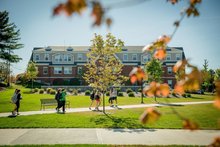Found 9 resources.
0
0
0

A New Hampshire-based college with a large online enrollment plans to open a new operations center in downtown Tucson in early 2020 that will eventually employ up to 350 people.
Topics: Asset building, Post-secondary, Workforce development
0
0
0
The Department of Housing and Urban Development issued a proposed rule Wednesday to improve its Section 3 Program, which requires funding recipients to employ low-income people and business.
Topics: Asset building, Housing, Legislation & Policy, Low-income, Metrics, Place-based, Workforce development
 Shared by Housing Is
on Apr 8, 2019
Shared by Housing Is
on Apr 8, 2019 0
0
0

The venture is a small yet innovative player in a growing number of nonprofits developing new models for work force training. Their overarching goal is upward mobility for low-income Americans and the two-thirds of workers without four-year college degrees.
Topics: Asset building, Broadband, Low-income, Workforce development
 Shared by Housing Is
on Mar 15, 2019
Shared by Housing Is
on Mar 15, 2019 0
0
0

In 2016, the health system teamed with Spartanburg Community College and the National Center for Construction Education and Research, a nonprofit that provides global training and certification. Together, the three entities began offering construction skills training to area residents.
Topics: Asset building, Health, Low-income, Partnerships, Workforce development
 Shared by Housing Is
on Mar 11, 2019
Shared by Housing Is
on Mar 11, 2019 0
1
1

When we stereotype or lazily assume low-wage workers to be “low skill,” it reinforces an often unspoken and pernicious view that they lack intelligence and ambition, maybe even the potential to master “higher-order” skilled work. In an economy that is supposed to operate as a meritocracy—but rarely does—too often, we see low wages and assume both the work and workers are low-value. This bias makes us overlook people for better-paying positions in which they might have excelled, hindering their social mobility.
Topics: Asset building, Low-income, Racial inequalities, Workforce development
 Shared by Housing Is
on Feb 19, 2019
Shared by Housing Is
on Feb 19, 2019 0
0
0
A whole host of factors — such as friends, housing and transportation — affect a person’s health and how much they need the social safety net. It’s time the government’s big health insurance programs took this reality into account, some lawmakers and policymakers are starting to argue.
Topics: Asset building, Cost effectiveness, Disabilities, Education, Food insecurity, Funding, Health, Homelessness, Housing, Legislation & Policy, Low-income, Medicaid / Medicare, Seniors, Transportation, Workforce development
 Shared by Housing Is
on Jan 25, 2019
Shared by Housing Is
on Jan 25, 2019 0
0
0

Recent research shows that social safety net programs benefit everyone.
Topics: Asset building, Child welfare, Community development, Food insecurity, Legislation & Policy, Medicaid / Medicare, Racial inequalities, Research, Workforce development
0
0
0

Some community colleges have found innovative partnerships with their public housing authorities may help combat student homelessness.
Topics: Asset building, CLPHA, Education, Homelessness, Housing, Low-income, Midwest, Pacific Northwest, Partnerships, Post-secondary, Stability, Workforce development
0
0
0

In 17 years, the Family Independence Initiative has enrolled 3,000 families — four people per household on average — and is operating in 14 different cities across the country. Now the initiative is making a move into 10 neighborhoods across Chicago. With a $2.6 million backing from Google.org and the City of Chicago, the organization hopes to combat poverty and improve the quality of life for 1,000 families on the South and West sides by giving money directly to them while also strengthening their social ties.
Topics: Asset building, Low-income, Midwest, Workforce development
